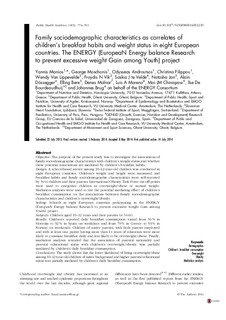| dc.contributor.author | Manios, Yannis | |
| dc.contributor.author | Moschonis, George | |
| dc.contributor.author | Androutsos, Odysseas | |
| dc.contributor.author | Filippou, Christina | |
| dc.contributor.author | Van Lippevelde, Wendy | |
| dc.contributor.author | Vik, Frøydis Nordgård | |
| dc.contributor.author | te Velde, Saskia J | |
| dc.contributor.author | Jan, Natasa | |
| dc.contributor.author | Dössegger, Alain | |
| dc.contributor.author | Bere, Elling | |
| dc.contributor.author | Molnár, Dénes | |
| dc.contributor.author | Moreno, Luis A | |
| dc.contributor.author | Chinapaw, Mai JM | |
| dc.contributor.author | De Bourdeaudhuij, Ilse | |
| dc.contributor.author | Brug, Johannes | |
| dc.date.accessioned | 2018-01-18T12:32:18Z | |
| dc.date.available | 2018-01-18T12:32:18Z | |
| dc.date.created | 2014-10-07T14:49:10Z | |
| dc.date.issued | 2014 | |
| dc.identifier.citation | Public Health Nutrition. 2014, 18 (5), 774-783. | nb_NO |
| dc.identifier.issn | 1368-9800 | |
| dc.identifier.uri | http://hdl.handle.net/11250/2478147 | |
| dc.description.abstract | Objective: The purpose of the present study was to investigate the associations of family sociodemographic characteristics with children’s weight status and whether these potential associations are mediated by children’s breakfast habits.
Design: A school-based survey among 10–12-year-old children was conducted in eight European countries. Children’s weight and height were measured and breakfast habits and family sociodemographic characteristics were self-reported by 5444 children and their parents. International Obesity Task Force cut-off points were used to categorize children as overweight/obese or normal weight. Mediation analyses were used to test the potential mediating effect of children’s breakfast consumption on the associations between family sociodemographic characteristics and children’s overweight/obesity.
Setting: Schools in eight European countries participating in the ENERGY (EuropeaN Energy balance Research to prevent excessive weight Gain among Youth) project.
Subjects: Children aged 10–12 years and their parents (n 5444).
Results: Children’s reported daily breakfast consumption varied from 56% in Slovenia to 92% in Spain on weekdays and from 79% in Greece to 93% in Norway on weekends. Children of native parents, with both parents employed and with at least one parent having more than 14 years of education were more likely to consume breakfast daily and less likely to be overweight/obese. Finally, mediation analyses revealed that the association of parental nationality and parental educational status with children’s overweight/obesity was partially mediated by children’s daily breakfast consumption.
Conclusions: The study shows that the lower likelihood of being overweight/obese among 10–12-year-old children of native background and higher parental educational status was partially mediated by children’s daily breakfast consumption. | nb_NO |
| dc.language.iso | eng | nb_NO |
| dc.publisher | Cambridge University Press | nb_NO |
| dc.title | Family sociodemographic characteristics as correlates of children's breakfast habits and weight status in eight European countries. The ENERGY (EuropeaN Energy balance Research to prevent excessive weight gain among youth) project | nb_NO |
| dc.type | Journal article | nb_NO |
| dc.type | Peer reviewed | nb_NO |
| dc.description.version | publishedVersion | nb_NO |
| dc.source.pagenumber | 774-783 | nb_NO |
| dc.source.volume | 18 | nb_NO |
| dc.source.journal | Public Health Nutrition | nb_NO |
| dc.source.issue | 5 | nb_NO |
| dc.identifier.doi | 10.1017/S1368980014001219 | |
| dc.identifier.cristin | 1162046 | |
| cristin.unitcode | 201,18,2,0 | |
| cristin.unitname | Institutt for folkehelse, idrett og ernæring | |
| cristin.ispublished | true | |
| cristin.fulltext | original | |
| cristin.qualitycode | 1 | |
